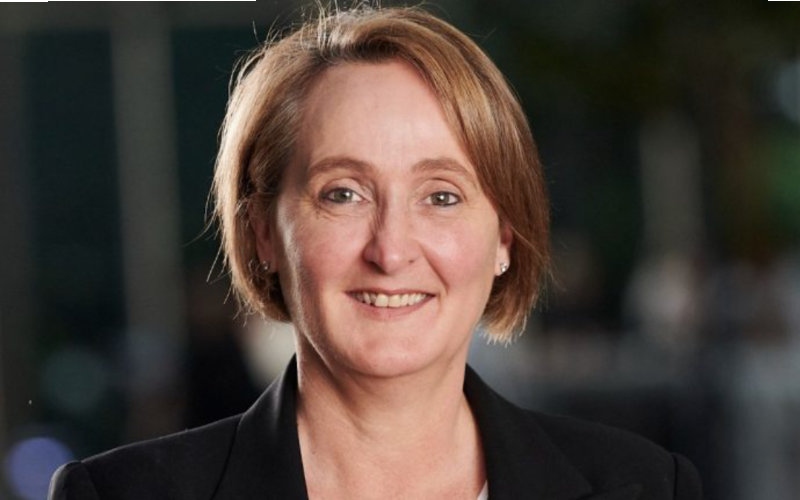New Qantas chief Vanessa Hudson’s strike breaking attempts have fallen flat, as pilots at its Network Aviation subsidiary went on a 24-hour strike on Wednesday, stranding passengers on both coasts. Michael Sainsbury reports.
Mimicking the hardcore approach of her predecessor Alan Joyce, Vanessa Hudson has shirt-fronted the FIFO pilots union in her first industrial relations test as chief executive of Qantas. And shareholders continue to flee.
The company’s share price has tanked since its $6.80 high in May, just before Alan Joyce controversially sold his $17 million in shares, falling below $5 this week as chairman Richard Goyder visited institutional investors trying to shore up his fragile position.
This week’s strike was the company’s first pilots strike since 1966 and Australia’s first domestic pilots strike since 1989. The Australian Federation of Air Pilots (AFAP) union said on Thursday it would resume talks with Qantas next week and not take any further industrial action until then.
Qantas’s inability to cover the Perth-based subsidiary’s 50 flights underscores the airline’s ageing fleet in which there was little investment during Alan Joyce’s time in the corporate cockpit, leaving a bill of about $4 billion in new planes for his successor.
The flights which were filled were exclusively corporate contracted fly-in-fly-out FIFO miners, for magnates like Gina Rinehart and Andrew Forrest.
Is Hudson already struggling to live up to the talking points of her video apology to customers, repeated during her appearance at last week’s Senate inquiry?
“There have been times when we have let the wider Australian public down and we understand why people are frustrated and also why some have lost faith in us,” she told the Senate on Sept. “As the new CEO. I am determined to fix that.”
A Joyceful Farewell – looming strike at Qantas’ miners’ carrier
Pilots’ demands
Network Aviation (QantasLink) pilots are serious about extracting a better deal from their Sydney overlords. The union, Australian Federation of Air Pilots (AFAP) covers more than 85% of Network Aviation’s pilots – and 99.5% voted in favour of protected industrial action (PIA).
“The AFAP remains disappointed that the new CEO of Qantas has seemingly endorsed this ongoing and toxic industrial relations culture within Qantas – for years it has damaged relations with employees and we hope she sees the writing on the wall soon and imposes some control on the company she leads. ” a note to NA pilots from the union sent last night said.
One pilot told MWM:
We will throw everything we have against the wall for this, because if we fail, then pilots will have to leave. If they leave the organisation, they have to leave the country because the demand for quality internationally is too strong,
It’s a big test for Hudson. Pilots in Sunstate and Eastern – QantasLink subsidiaries on the east coast – have already voted for Protected Industrial Action and are watching the negotiations closely.
It comes at a time, the first time in at least three decades, when pilots have the upper hand. US and Middle East airlines are offering deals that pilots have described as “extraordinary”. The new Saudi Arabian carrier Riyadh Air, designed to compete with Emirates, Qatar and Etihad, is due to begin operations in 2025 is offering $US500,000 tax free. US freight giants led by Atlas AIr have been busy too poaching Australian pilots.
Meanwhile, Qantas’ mainline is short of pilots and is now actively recruiting across the whole for the first time ever. Rex Airlines has complained of Qantas poaching its pilots and airlines in Asia, including Cathay Pacific, are recruiting for the first time since 2019. In the US, United Airlines has become the latest major airline to ink a new deal, giving pilots improved pay and conditions.
“For the past 30 years industrial relations in the Australian airline industry had been ‘here’s the deal’ from management and pilots saying ‘we will take it.’ That’s now changing and the whole industry is watching – quite nervously,” a non-Qantas airline executive told MWM.
A subsidiary in disarray?
Allegedly, the Perth based subsidiary is in disarray, cut to the bones by Joyce’s regional boss John Gissing, with pilots mulling a no-confidence vote in chief pilot and flight operations manager Evan Bartlett whose work history covers five jobs in the past 11 years.
“A fundamental aspect of a chief pilot is somebody who is approachable and can manage the safety of the organisation”, one Network Aviation pilot told MWM, adding that Qantas had morphed into a strange company where the chief pilot is not a representative of the pilots, but simply a manager for the organisation.
Bartlett’s position At Network Aviation is both chief pilot and General Manager of Flight Operations. “The problem we find with modern organisations is that most chief pilots nowadays, he doesn’t fly and hasn’t flown for a very long time. And so he’s unfamiliar with the dangers and the risks of the operation and the challenges of the operating machinery,” the pilot said.
Pilots at the group have painted a picture of a subsidiary run “on an oily rag”.
Not just about better pay
They also say that the bid to get a better deal out of management is not just about money but also conditions and lifestyle options where the group – along with other regional subsidiaries – fall short of the airline’s mainline operation as well as Jetstar.
The aircraft are painted red and look the same as Qantas, but the pilots, cabin crew, engineers and ground staff earn significantly less than their Qantas counterparts for doing the same job… and work harder for less money.
During Covid. Network Aviation continued to operate and actually expanded due to the booming fly-in-fly-out operations in Western Australia. It more than doubled the flying, but cost cutting management did not double the pilot numbers choosing to just work existing staff harder.
“They were over-milking the cow, while there were massive amounts of unemployed pilots in the world desperately needing a job. Lifestyle has disappeared completely with rostering being so tight. We get eight days off a month, but those days are usually scattered throughout the weekday – not weekends,” said another.
“There are double shifts, multiple early mornings (4 am sign-ons) and working most weekends, as well as overnights. Pilots are unable to access their leave, no roster requests, no lifestyle bids or event granted a specific day off. Food and accommodation allowances are below standards, as are benefits like staff travel upgrades.”
“Being a pilot used to be a prestigious job,” yet another pilot told MWM. “Qantas has made Network Aviation very cheap and nasty. We do not want to take industrial action but have been pushed into a corner by a bunch of very greedy people who run this company and I’m more concerned about getting their bonuses than valuing and taking care of the staff and creating a good place to work.”
“It is an extremely toxic workplace. There have also been ongoing issues with serious bullying and harassment in the workplace. There is mismanagement and incompetence, company cover-ups, yelling, passive aggressive emails are all normal here.”
Joyce is spoiling for a fight with unions (pity about Qantas customers)
The bargaining process
Bargaining parties sign an agreement that passes Fair Work’s better off overall test (BOOT) which means pay and conditions are equal to or better than the award at the moment the test is conducted. Depending on the schedule of increases in remuneration vs CPI, it might fall below award conditions within its first year. In this case, some employees are well below the award because of that, but it’s compounded by their employer dragging negotiations on for years after the previous agreement expired.
While Network Aviation chief operating officer Trevor Worgan has been the front man – and potential fall guy for Qantas management – multiple sources from inside the company, in the wider Qantas group, and broader airline sector lay the blame for the situation the feet of QantasLink’s John Gissing, one of Alan Joyce’s most loyal lieutenants.
“John is responsible for the extreme cost cutting and the poor culture that we find in the regionals – that you do not find in mainline or even Jetstar. He has set up a scenario and he is employed to screw employees. He sets the budget. He sets the targets. He gets the big bonuses. He has been publicly aggressive and dismissive towards pilots,” one insider said.
While Gissing is leaving Qantas, he will stay on for 12 months as a “consultant”.
Qantas management, once lauded in the share market as tough, savvy operators, are beginning to look as stranded as Qantas passengers. Their big test comes at the annual meeting in early November. Appointing an insider as successor to Alan Joyce – indeed one involved in the 8,000 ‘ghost flights’ sting by the competition regulator ACCC – may yet appear to be another mistake by the board.
The sharemarket is not the only market. The market for pilots and other staff now has severe supply-side constraints as Vanessa Hudson is now discovering. Of one thing we can be sure, the costs of failing in the IR market and the costs of failing to replenish the fleet over the past decade will be passed on to Qantas customers in higher ticket prices.
Alan Joyce to depart. Is it time for Qantas to retire Jetstar too?
Michael Sainsbury is a former China correspondent who has lived and worked across North, Southeast and South Asia for 11 years. Now based in regional Australia, he has more than 25 years’ experience writing about business, politics and human rights in Australia and the Indo-Pacific. He has worked for News Corp, Fairfax, Nikkei and a range of independent media outlets and has won multiple awards in Australia and Asia for his reporting. He is a fierce believer in the importance of independent media.

